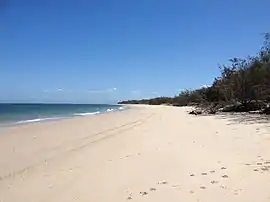Bribie Island National Park
Bribie Island National Park is an Australian national park in the City of Moreton Bay, Queensland,[1] 68 kilometres (42 miles) north of Brisbane. The park covers approximately one third of Bribie Island. The tidal wetlands and areas of water around the islands are protected within the Moreton Bay Marine Park.[2]
| Bribie Island National Park Queensland | |
|---|---|
 Woorim Beach | |
 Bribie Island National Park | |
| Coordinates | 26°52′02″S 153°07′36″E |
| Established | 1994 |
| Area | 49 km2 (18.9 sq mi) |
| Managing authorities | Queensland Parks and Wildlife Service |
| Website | Bribie Island National Park |
| See also | Protected areas of Queensland |
Visitors are attracted to the park for angling, boating and the views of the nearby Glass House Mountains.
This is a great place for bird watchers and lovers of spring wildflowers.[3] The average altitude of the terrain is 10 meters.[4]
Access
The beach is accessible by 4WD from Woorim on the east side of the island. However, in order to drive in the national park, one must first acquire a Vehicle Permit from either the Bongaree Caravan Park or the national parks website. There is also an Inland Track which goes from White Patch in Banksia Beach to the top of the Ocean Beach camping area.
Camping
There are several camping grounds in the Bribie Island Nation Park. These include: Poverty Creek, which has 12 campsites as well as an open camping ground which holds 80, Gallaghers Point which has six campsites, Mission Point which has 12 campsites which are only accessible by boat, Lime Pocket which has six campsites, also only accessible by boat and Ocean Beach which has 63 campsites. Mission Point has toilets, picnic tables and fireplaces.[2]
A camping permit is required to camp at these sites[5] which can be purchased from the Bongaree Caravan Park or the Queensland Department of Environment and Resources Management website. Generators are not permitted and visitors should bring their own firewood.[5]
Wildlife
At dawn or dusk, kangaroos, wallabies, dingoes, and emus can be seen roaming the island.[6]
See also
References
- "Bribie Island National Park (entry 39395)". Queensland Place Names. Queensland Government. Retrieved 25 June 2017.
- "Bribie Island". Sydney Morning Herald. Fairfax Media. 1 January 2009. Retrieved 6 June 2011.
- Science, jurisdiction=Queensland; sector=government; corporateName=Department of Environment and (20 October 2009). "Bribie Island National Park and Recreation Area". Parks and forests | Department of Environment and Science, Queensland. Retrieved 6 February 2022.
{{cite web}}: CS1 maint: multiple names: authors list (link) - "Bribie Island National Park topographic map, elevation, relief". topographic-map.com. Retrieved 7 February 2022.
- "Bribie Island Recreational Area: Camping information". Department of Environment and Resource Management. 21 June 2010. Archived from the original on 29 November 2012. Retrieved 6 June 2011.
- Kennedy, Leesa (16 February 2017). "Wildlife On Bribie Island". GemLife | Over 50s Resorts. Retrieved 7 February 2022.